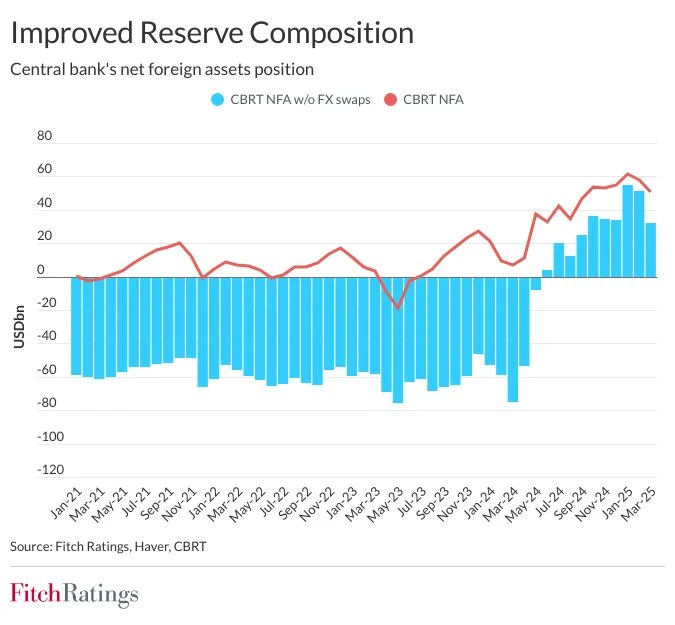‘Türkiye has capacity to manage volatility,’ Fitch commends Turkish central bank
 Photo illustration depicts rolled Turkish lira banknotes and fluctuating candlestick chart patterns overlaid with the Turkish flag, symbolizing volatile market movements, created on Apr. 5, 2025. (Collage by Türkiye Today)
Photo illustration depicts rolled Turkish lira banknotes and fluctuating candlestick chart patterns overlaid with the Turkish flag, symbolizing volatile market movements, created on Apr. 5, 2025. (Collage by Türkiye Today)
The Central Bank of the Republic of Türkiye (CBRT) has demonstrated the capacity to manage current levels of market volatility to ensure economic confidence, U.S.-based credit rating agency Fitch Ratings said in its latest report released on Wednesday.
“Fitch believes that Turkiye has the capacity to manage the current level of volatility given the stated commitment to the current policy mix, our assumption that economic authorities, notably the central bank, have room to tighten monetary policy if necessary, a low current account deficit and stronger reserve buffers than during previous instances of stress,” Fitch said.

Fitch emphasized that international reserves and macroeconomic policy will play a key role in evaluating the potential impact of recent political developments in Türkiye on its credit rating, which currently stands at “BB-/Stable.”
In its assessment, the agency noted that the Turkish economic administration has responded with a policy mix characterized by tight monetary stance and consistency in fiscal and income policies.
Fitch stated that Türkiye’s commitment to its current policy framework—along with the central bank’s assumed willingness and room to tighten monetary policy if needed, a low current account deficit, and stronger reserve buffers compared to previous periods of stress—underpins its confidence in the country’s ability to handle ongoing market fluctuations.

Fitch also estimates that inflation will decline to 25% by the end of 2025, down from 44.4% in 2024. Türkiye’s annual inflation declined for the 10th consecutive month in March, falling to 38.1%, according to the Turkish Statistical Institute.
Turkish economy passes March 19 test
Commenting on the report in an interview with business-focused bloomberght.com, Erich Arispe, senior director at Fitch Ratings, said the Turkish government’s rapid and clear messaging during the market turbulence on March 19 helped boost investor confidence.
On March 19, the Turkish markets were rattled by panic-driven sell-offs amid a corruption probe targeting Istanbul Mayor Ekrem Imamoglu, causing the lira to drop more than 12% and Istanbul stocks to lose over 7%. In response, the CBRT intervened by selling more than $25 billion in reserves to ease demand for foreign currency. Following the intervention, the lira recovered slightly, reducing its losses to around 4%, strengthening from 41 to 38 against the U.S. dollar. Before the turmoil, it had hovered around 36.
To further stabilize the markets, the Turkish Capital Markets Board and Borsa Istanbul announced measures, including a ban on short-selling and authorization of share repurchase programs by listed companies.
“The CBRT’s declaration of ‘we are here’ was a clear signal to the markets. This determination is a significant indicator,” Arispe said.
He also noted that the central bank’s reserve buildup played a role in the agency’s credit rating decision, while adding: “We are closely monitoring recent declines in reserves, particularly the composition of those reserves.”
Looking ahead, Arispe reiterated Fitch’s forecast of inflation remaining above 30% through the end of 2025, but said a downward trend is expected from 2026. “Improvements in macroeconomic indicators, policy stability, and reserve trends will be key to Türkiye’s credit outlook,” he added.



